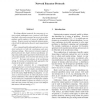Free Online Productivity Tools
i2Speak
i2Symbol
i2OCR
iTex2Img
iWeb2Print
iWeb2Shot
i2Type
iPdf2Split
iPdf2Merge
i2Bopomofo
i2Arabic
i2Style
i2Image
i2PDF
iLatex2Rtf
Sci2ools
FOCS
2008
IEEE
2008
IEEE
Network Extractor Protocols
We design efficient protocols for processors to extract private randomness over a network with Byzantine faults, when each processor has access to an independent weakly-random n-bit source of sufficient minentropy. We give several such network extractor protocols in both the information theoretic and computational settings. For a computationally unbounded adversary, we construct protocols in both the synchronous and asynchronous settings. These network extractors imply efficient protocols for leader election (synchronous setting only) and Byzantine agreement which tolerate a linear fraction of faults, even when the min-entropy is only 2(log n)Ω(1) . For larger min-entropy, in the synchronous setting the fraction of tolerable faults approaches the bounds in the perfect-randomness case. Our network extractors for a computationally bounded adversary work in the synchronous setting even when 99% of the parties are faulty, assuming trapdoor permutations exist. Further, assuming a stro...
Efficient Protocol | FOCS 2008 | Network Extractor | Synchronous Setting | Theoretical Computer Science |
Related Content
| Added | 29 May 2010 |
| Updated | 29 May 2010 |
| Type | Conference |
| Year | 2008 |
| Where | FOCS |
| Authors | Yael Tauman Kalai, Xin Li, Anup Rao, David Zuckerman |
Comments (0)

